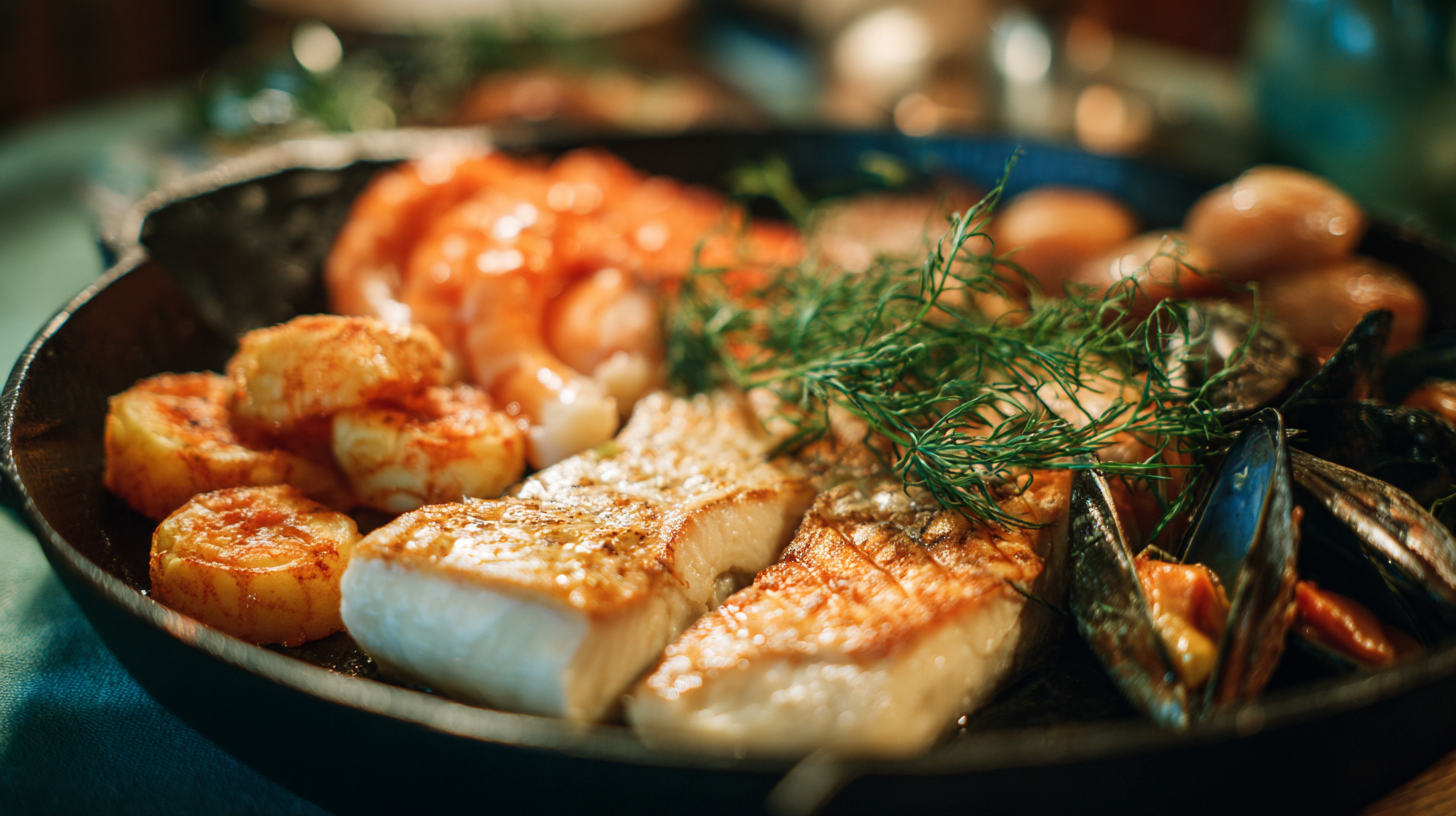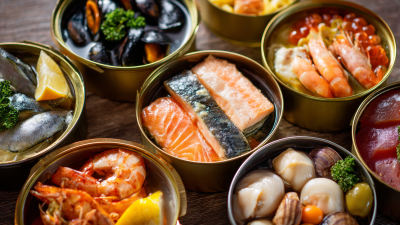The Sustainable Rise of Tinned Fish Companies: A Deep Dive into Ocean-Friendly Eating
As the trend toward sustainable eating continues to gain momentum, tinned fish companies are redefining their role in the food industry. With the rise of eco-conscious consumers, these companies are not only offering convenience and affordability but also championing the health of our oceans. Renowned seafood sustainability expert, Dr. Marina Fisher, has noted, "Tinned fish companies are leading the way in responsible sourcing and environmental stewardship, ensuring that consumers can enjoy seafood without compromising the health of our marine ecosystems."

In this exploration of the sustainable rise of tinned fish companies, we will delve into how these businesses are adapting their practices to align with ocean-friendly eating. From innovative fishing techniques to sustainable packaging solutions, the sector is making significant strides that contribute to both consumer health and environmental protection. With a collective commitment to reducing overfishing and supporting ocean conservation, the top tinned fish companies are emerging as influential players in the quest for a more sustainable food future.
Join us as we highlight the "Top 5" tinned fish companies that are not only redefining convenience in the kitchen but also advocating for a healthier planet, demonstrating that good food choices can indeed go hand in hand with good environmental practices.
The Eco-Conscious Shift: Tinned Fish as a Sustainable Protein Source
As the world becomes increasingly aware of environmental issues and the need for sustainable food sources, tinned fish is emerging as a compelling option for eco-conscious consumers. This eco-friendly choice not only offers a source of high-quality protein but also promotes responsible fishing practices that help protect our oceans.

Companies focused on sustainability are leveraging certifications such as the Marine Stewardship Council (MSC) to ensure that their products are sourced from well-managed fisheries, thereby reducing overfishing and supporting marine biodiversity.
Moreover, the convenience and long shelf-life of tinned fish make it an attractive option for consumers aiming to incorporate more sustainable choices into their diets. Innovations in packaging and processing have also made it easier to access a variety of species, from sardines to mackerel, which are known for their nutritional benefits and lower environmental impact compared to larger fish.
As awareness grows, tinned fish is not just a dietary staple; it represents a shift towards eco-conscious eating that aligns with consumers' values of sustainability and health.
Innovative Practices: How Tinned Fish Companies Are Supporting Ocean Health
The rise of tinned fish companies is not only a culinary trend but also a movement towards ocean-friendly eating practices. Innovative practices among these companies are reshaping their industry by prioritizing sustainability and ocean health. According to the Marine Conservation Society, overfishing remains a critical issue, with 34% of global fish stocks overfished as of 2020. Many tinned fish producers are taking actionable steps to source their products from fisheries that adhere to sustainable practices, thus ensuring that they do not contribute to the depletion of marine life.
In addition to responsible sourcing, many tinned fish companies are investing in eco-friendly packaging and processes to further reduce their environmental impact. A 2023 report by the Ellen MacArthur Foundation highlighted that around 8 million tons of plastic enter the oceans each year, prompting these companies to adopt biodegradable or recyclable materials. Some brands are even spearheading initiative programs to restore habitats and reduce plastic pollution in marine environments. By aligning business practices with environmental stewardship, tinned fish companies are not just offering meals, but advancing a greater goal of ocean health preservation.
Consumer Trends: The Growing Demand for Ocean-Friendly Seafood Alternatives
In recent years, consumer trends have increasingly shifted towards sustainable eating practices, particularly in the seafood sector. With heightened awareness of environmental issues, more people are seeking out ocean-friendly seafood alternatives that support ethical fishing practices. Tinned fish companies are at the forefront of this movement, offering a variety of products that not only satisfy taste preferences but also align with consumers' ecological values. Brands are highlighting transparent sourcing methods and sustainable fishing techniques, making it easier for consumers to make informed choices.
The growing demand for ocean-friendly seafood alternatives is also fueled by the health benefits associated with consuming fish, such as omega-3 fatty acids and lean protein. As consumers become more conscious of their dietary choices, they are increasingly turning to tinned fish as a convenient and nutritious option.
This trend is not just a response to health consciousness; it's also a reflection of a broader cultural shift towards sustainability. With social media amplifying the visibility of eco-friendly products, the popularity of tinned fish is set to rise as more individuals seek to enjoy delicious meals while minimizing their impact on ocean ecosystems.
Success Stories: Brands Leading the Charge in Sustainable Tinned Fish Production
The sustainable rise of tinned fish companies reflects a growing consumer demand for ocean-friendly eating options. Brands that prioritize sustainability are not only capturing market share, but also reshaping consumer perceptions. Recent reports indicate that the global tinned fish market is projected to reach approximately $2.9 billion by 2025, with sustainability as a key driver of this growth. As consumers increasingly seek transparency in sourcing and ethical fishing practices, innovative brands are stepping up to lead the charge.
One noteworthy success story in the industry illustrates the shift in consumer attitudes towards tinned fish. By entering the North American market with a commitment to sustainability, a brand saw a rapid expansion from zero to over 1800 retail locations. This impressive growth can be attributed to its strategic focus on high-quality ingredients and eco-friendly production methods, appealing to health-conscious consumers looking for convenient yet nutritious meal options. In a landscape where traditional perceptions of canned food often lean towards cheap and industrialized, these progressive brands are redefining the category, marrying convenience with ethical consumption.

Navigating Challenges: Balancing Sustainability with Economic Viability in the Seafood Industry
The seafood industry faces a dual challenge of maintaining sustainable practices while ensuring economic viability. As consumer demand for tinned fish rises, companies are grappling with the need to source their products responsibly. This necessitates a careful balance between sustainable fishing methods and the economic implications on fishers and the overall market. Practices such as overfishing and bycatch threaten marine ecosystems, which in turn impacts future supply and profitability.
To navigate these challenges, many companies are adopting innovative approaches, such as collaborating with scientists to monitor fish populations and engaging with local communities for sustainable sourcing. Investing in aquaculture and alternative protein sources also presents opportunities to alleviate pressure on wild fish stocks. By prioritizing transparency and responsible sourcing, these companies can not only meet the rising demand for sustainable seafood but also drive a shift in consumer habits towards ocean-friendly eating. These strategies are essential for fostering a resilient seafood industry capable of thriving amidst the complexities of both environmental stewardship and economic realities.
| Aspect | Current Trends | Sustainability Efforts | Economic Challenges |
|---|---|---|---|
| Market Demand | Increasing consumer interest in healthy, convenient options | Focus on sourcing from certified sustainable fisheries | Balancing higher costs of sustainable sourcing with consumer prices |
| Environmental Impact | Shift towards eco-friendly practices | Implementation of responsible packaging and waste reduction | Navigating the costs associated with eco-innovation |
| Consumer Awareness | Rise in public campaigns for ocean health | Engagement in community education about sustainable seafood | Challenge to effectively communicate sustainability benefits |
| Product Innovation | Growing variety of flavors and preparations | Emphasis on transparency in sourcing and production | Investment needed for research and development |

